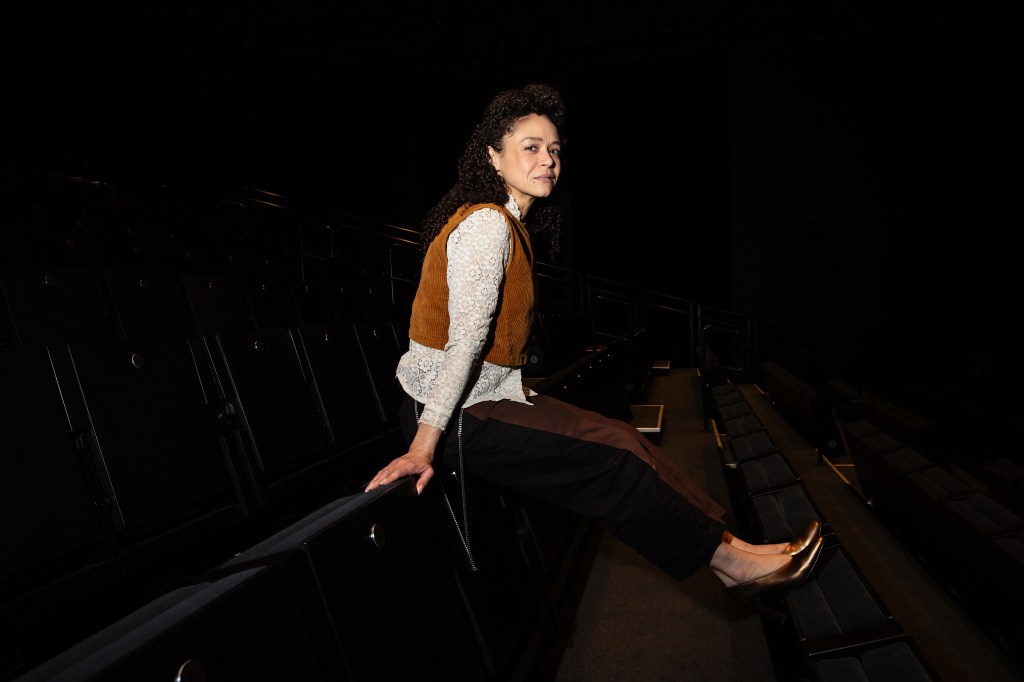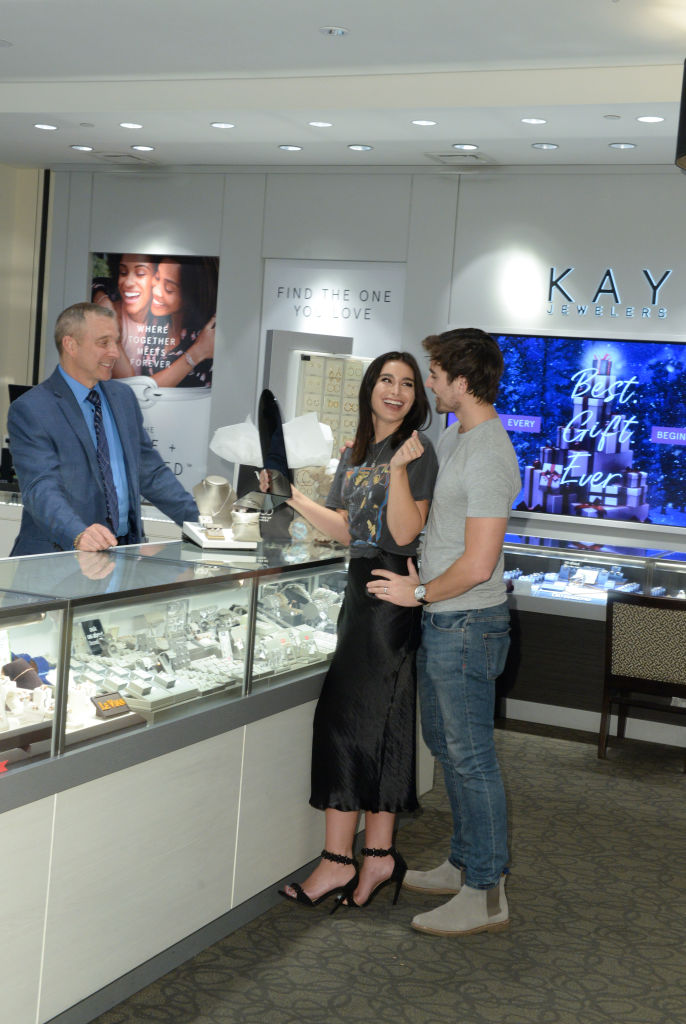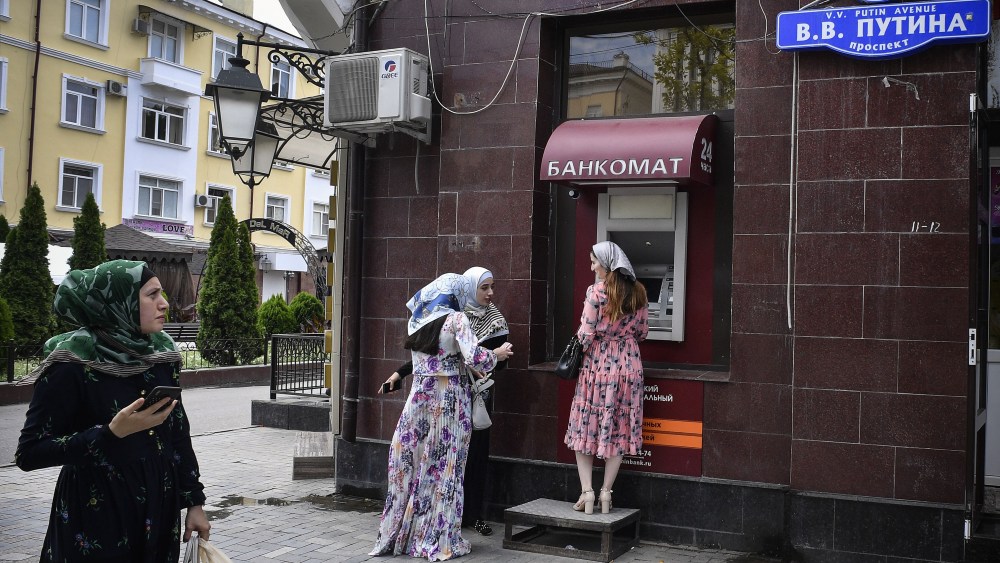Amber Gray is here: sitting in the back row of the theater at The Shed on a mid-November afternoon, a cup of tea in hand. Sitting on a high-backed bar stool, the actress is facing the empty stage where in several hours she will perform the next showing of “Here We Are.” The actress stars in the new musical production by Stephen Sondheim and David Ives, notable for being Sondheim’s final work before he died in late 2021.
“I auditioned on March 22, which is Sondheim’s and Andrew Lloyd Webber’s birthday,” says Gray of coming onboard the project. “So everything about it felt kind of blessed from the beginning.”
The musical is based on two films by Surrealist Spanish filmmaker Luis Buñuel, “The Discreet Charm of the Bourgeoisie” and “Exterminating Angel.” In the first half of the production, within a sparse set, the cast embarks on a neverending quest for brunch; in the second act, they find themselves camped out in the ornate living room of a friend’s estate — and without rational explanation, they are unable to leave. The end of the world looms outside of the privileged space.
“I’m spiritually in a place where I am thinking about these things,” Gray says of the production, a social satire that peddles in existentialism. “And I love that those two men, David Ives and Sondheim, in the last third of their lives as seniors are also attracted to those movies and these questions. I find that very telling.”

The actress comes to the new production from a long run with “Hadestown,” which earned her a Tony nomination in 2019 for her portrayal of Persephone. After Gray left the role in 2022, she went on to star in a Sam Gold-directed production of “Macbeth,” and earlier this year made her solo concert debut with “Gray Matter” at 54 Below, which explored the range of her musical theater influences.
“I really believe you attract where you’re at,” Gray says. “And at the time I read the script [for ‘Here We Are’], which was early March, I was writing my solo cabaret. I had come off of a year of studying lots of philosophy, psychology, neuroscience, religion. I’d been hanging out with a lot of midwives and death doulas, taking shaman earth medicine ceremonies. So a play about existentialism — oh my gosh. I was like, well, this is coming to me for a reason right now,” she adds. “I do think about the meaning of life all the time, and how to live well and the end of the world. These are the things I think about every day. So it was really bizarre to read a play that was exactly where I was at spiritually. Everything about it felt really kismet from the beginning.”
The production’s surrealist ambiguity opens up the potential for various interpretations within the same crowd. To some, it’s a comedy; for others, the sense of existential dread might resonate more strongly.
“Steven Spielberg was able to finally come last night,” Gray says. Spielberg, who collaborated with Sondheim on the 2021 film adaptation of “West Side Story,” is a producer of the “Here We Are.” “He was like, ‘so fun, so depressing — it’s like a nuclear winter.’ And I was like — yeah,” she continues. “And some people watch it and don’t get any of that. They don’t think any of those deeper questions about the meaning of life. And that’s what’s so beautiful about theater. People interpret it in all kinds of ways and you cannot control that outcome.”
While Sondheim passed away before the production at The Shed was cast — and before the script was finished — Gray says she was able to meet the composer earlier in her career, after a performance of “Natasha, Pierre & the Great Comet of 1812.” “He was a big Dave Malloy fan,” says Gray, who starred in the Broadway production.
“So much of my musical theater career has been with these contemporary musical theater composers who I adore, like Anaïs Mitchell, Heather Christian, Dave Malloy, The Bengsons. The sound of the American musical is changing over the years and has a lot of space for different types of voices,” says Gray, who incorporated many of those composers into her solo show earlier this year.
“I did not study musical theater; I studied just straight acting. But I had this idea in my head while I was studying that there was a musical theater sound, because I think there was for many years. And now it’s a bit more diverse what voices we associate with musical theater,” adds Gray, who trained at NYU’s Tisch School of the Arts. “I never thought I was going to originate a Sondheim musical. It’s a piece of history and I’m very honored to be a part of it.”
“Here We Are,” which opened in late October, is currently extended through mid-January.
“It’s felt really juicy, and it just continues to get better and better, which is the dream, right?” Gray says. “I hope to keep discovering and keep getting better at it, which means the work becomes easier and more fun. And then it’ll go away — like all theater does.”




